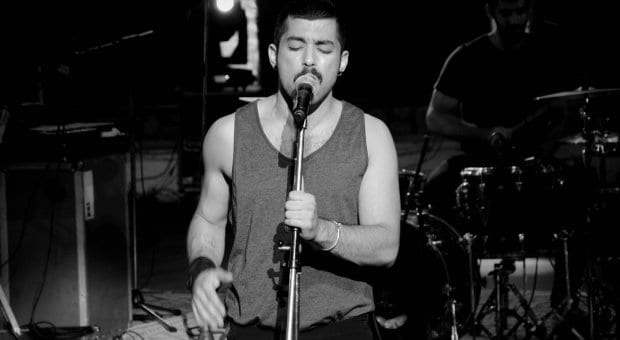When someone brings up Beirut in conversation, it’s not generally a terribly positive association. For a lot of us, this Middle Eastern city is still equated with open warfare, bombings, smouldering ruins and hostages. It can be a surprise to learn that Lebanon’s capital city now boasts a thriving tourist scene, revitalized infrastructure and a surging youth culture.
Mashrou’ Leila is at the forefront of this dynamic movement, giving voice to a generation fighting against oppression. Formed in 2008 at the University of Beirut, this group of seven musicians has taken the Middle East by storm, moving quickly from small clubs to major festivals and concert stages around the world. The band’s rise in popularity coincided neatly with the 2010 Arab Spring protests that aimed to oust oppressive regimes, as the region’s youth began to take matters into their own hands.
One of Mashrou’ Leila’s greatest strengths is an exciting, magnetic singer named Hamed Sinno, who some are hailing as the new Freddie Mercury. But while there may be some cursory similarities (facial hair, olive skin), this comparison actually does Sinno a disservice; Mercury was all about bravado and showmanship, while Sinno’s warm baritone boasts an honest, raw delivery and pensive introspection that is both personal and political. The translated lyric of the band’s song “From the Queue” (“Min el Tabour,” in its original Lebanese) is about as far from “Bohemian Rhapsody” as one can get.
“We’ve been fighting for 50 years, the same war we can’t forget. The country’s a waiting room, and the queue goes to the airport. We’re sick of religion, tired of humiliation, longing for hunger, full from eating shit.”
This scathing but heartfelt lament runs through many of Mashrou’ Leila’s songs, evoking the feelings of frustration, anger and hope that so many Lebanese citizens feel in the wake of the chaos in their region. But according to Sinno, life carries on, and life is good.
“Things are always a bit tense; more so over the last few months because of the political situation,” he admits. “But there’s always a good party to find and an exhibition worth seeing.”
Sinno still makes his home in Beirut, though he and the band have travelled all around the world with their indie-rock gospel of personal freedoms and human rights. Their upcoming appearance for Toronto’s Small World Music Festival will be their second trip to Canada, having previously made a concert stop in Montreal two years ago. As a gay man, Sinno is acutely aware of the differences for LGBT Canadians in comparison to his home country.
“The laws protecting the LGBT community are non-existent,” he says. “There’s a law that prohibits sex that’s deemed against nature. It’s a pretty vague law, but it gets used a lot.”
As with so many places, money makes a big difference in avoiding persecution if you’re gay and living in Beirut. Things aren’t too bad for the rich queers, but it’s a different story for the average ’mo.
“There’s more evidence seen, for lack of a better term, of the pink dollar,” Sinno says. “In general, the working class tend to suffer a bit more when it comes to getting in trouble with the police, because of the way the system works here. They’ll second guess trying to arrest someone in a position of power, so there’s a double burden when you’re a working-class homosexual.”
Of course, however different our cultures and our politics, there are some inalienable truths when it comes to being an aspiring rock star. Sinno is amused when asked whether his family supports his dream of being a professional musician.
“Oh hell, no,” he laughs. “They emotionally blackmailed me into studying something else, so now I have a fine arts degree. They finally came around when they saw that the band was getting somewhere, which I think is usually the way it is with parents.”
Mashrou’ Leila appears Fri, Oct 4 at Lee’s Palace, 529 Bloor St W.
smallworldmusic.com

 Why you can trust Xtra
Why you can trust Xtra


